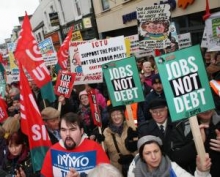Irish take to the streets to protest bank bailout costs

The Irish Congress of Trade Unions said the protests – in Dublin, Cork, Galway, Limerick, Sligo and Waterford – demonstrated huge public anger at the ongoing economic and social cost of the bank bailout. Addressing a crowd of over 60,000 in Dublin, Congress general secretary David Begg said it was unfair that Ireland, with a population of less than five million, had paid 42% of total European bank bailout costs – and was being required to keep paying, even if a limited deal is done to restructure Ireland’s repayments
“The European banking crisis has so far cost each individual in Ireland nearly €9,000. The average amount per person in the rest of the EU is €192. The €64 billion total price does not represent money spent by Irish people or their Government. It was the cost of preventing the collapse of the European banking system and, probably, the Euro. The entire EU benefitted, but Ireland is still being expected to pay the €64 billion bill alone,” he said.
Recent Eurostat statistics show that Ireland, whose economic output totals just 1.2% of EU GDP, has already paid €41 billion in bank debts. This is equivalent to 25% of Ireland’s GDP and a staggering 42% of the total cost of the European banking crisis.
A recent paper by the Nevin Economic Research Institute (NERI), an Irish trade union-supported think tank, said an acceptable agreement on Ireland’s bank debt must go beyond a rescheduling of payments and reduce the value of the principal debt.
“Changes to the repayment schedule may help Ireland in the short term, but this amount of bank debt remains unsustainable and will cripple Ireland for generations. No matter what sacrifices we make, there is no hope of sustained recovery until the burden is lifted,” said Mr Begg.
Irish voices
A number of people affected by unemployment, emigration, higher taxes and public service cuts addressed the rally. They included Anne McPartland from Dundalk in the North-East of Ireland, who has been out of full-time employment for three years. “I feel like I’m educating my daughter to eventually leave the country. €64 billion debt is not just a figure on a piece of paper. It’s the burden that is weighing down the hopes of my daughter, your children, you and me. We need Europe to listen,” she said.
Public service IT worker Shane Lambert, who has suffered tax hikes plus a 15% pay cut, said: “Decisions for our future, like can we afford to have children, are being shaped for us and taken out of our hands. We’re just looking for a bit of hope and stability.”
Laura McKenna, who lost her job at Dublin airport just before Christmas, said she saw no employment prospects in the near future. “I’ve lost my job and my plans to go to college have been put on ice because I can’t afford the costs,” she said.
Source: Irish Congress of Trade Unions

